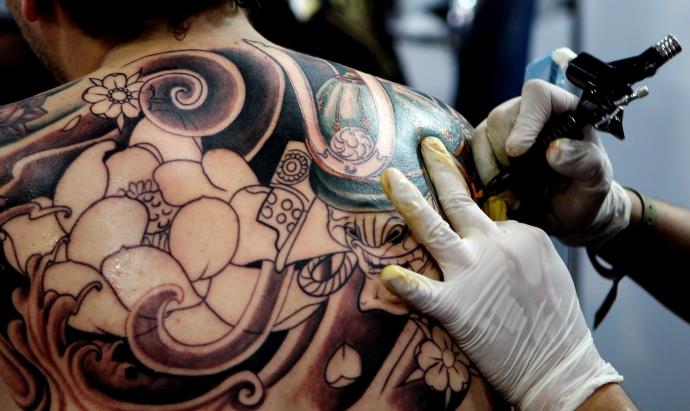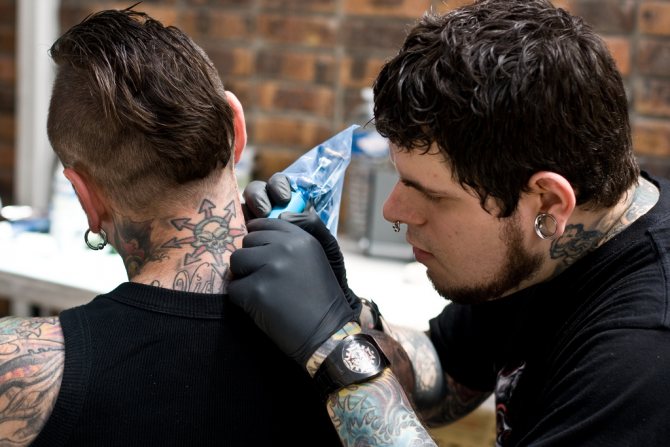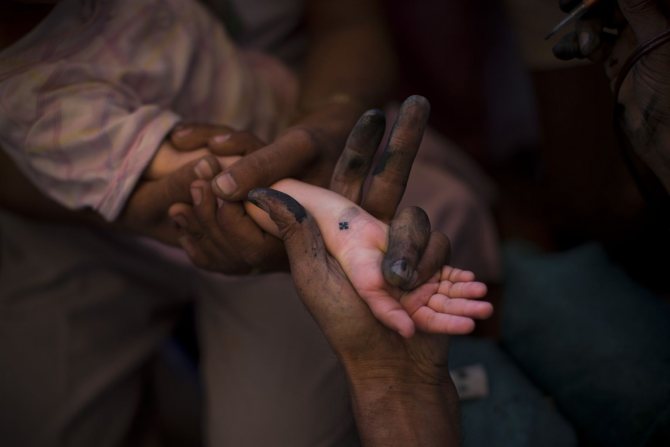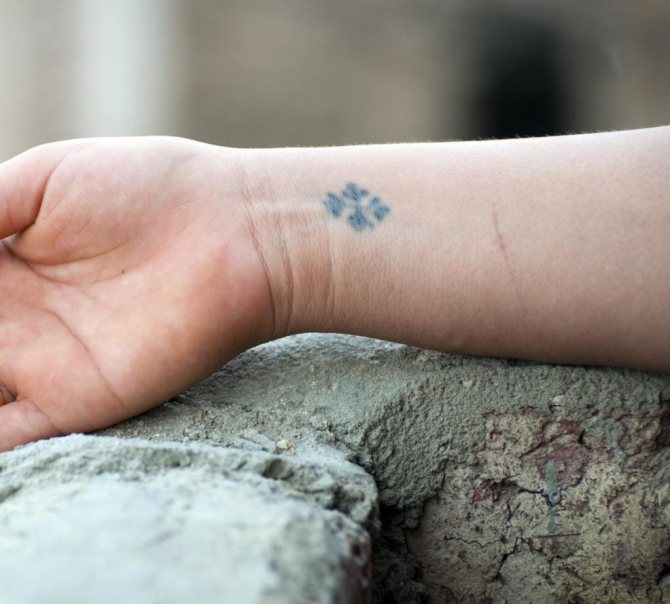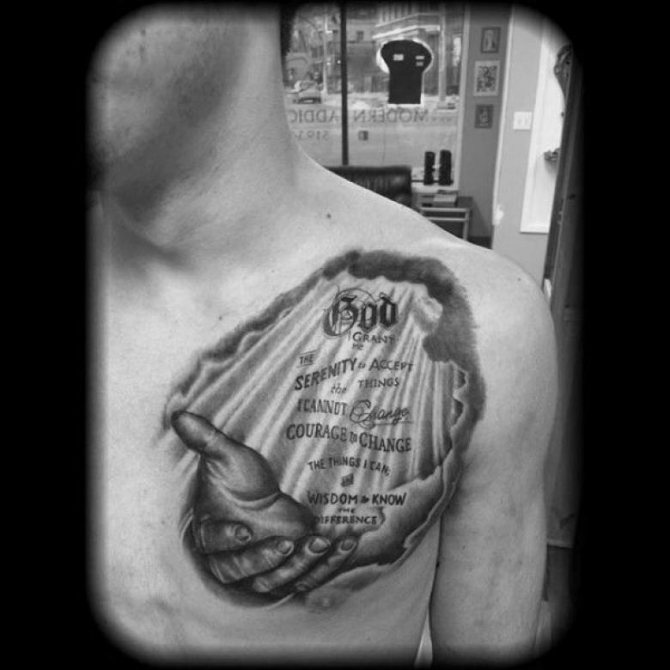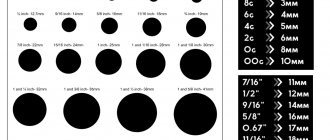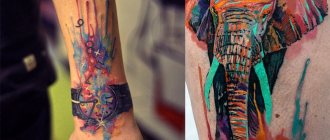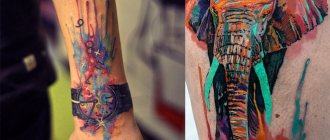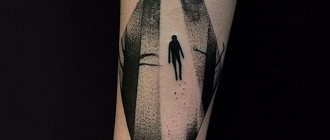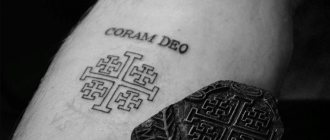These days on the streets of cities you can often meet people with tattoos on the body. In some musical subcultures, they have gained popularity comparable to the fashion for rock bands, clothes and hairstyles themselves. Tattoos are becoming common among ordinary people as well. In the summer it is not difficult to meet girls with tattoos on the sacrum or ankles. How should we treat this, is it good or bad, can a person with tattoos be a Christian? About this phenomenon argues Priest John Kurbatsky (Russian Orthodox Church, Kaluga).
***
A "fashionable" craze
Every year, especially in summer, we notice how many people, especially young people, have fashionable "accessories" in the form of tattoos on their bodies. The number of tattoo parlors in cities is becoming comparable to the number of cafes. People give each other certificates to visit these salons. Most of the visitors there are, of course, young people. If earlier tattoos were an element of the prison or, more rarely, the army subculture, today it has become fashionable and customary phenomenon. It happens that parents themselves bring their teenagers to tattoo parlors. Although in general it is difficult to imagine parents wanting to "decorate" their children in this way. In Spain, I remember an advertising board of a tattoo parlor. It depicted an infant in a diaper, painted from head to toe. And at the top is the inscription: "Mom, I'm sorry! The older generation looks at the growing popularity of tattoos with bewilderment and horror. Many still remember that tattoos were applied forcibly in German concentration camps. But there are some dads and moms who want to keep up with the times. There is a well-known case where a pensioner in his 65 years of age had a tattoo on his body for the first time.
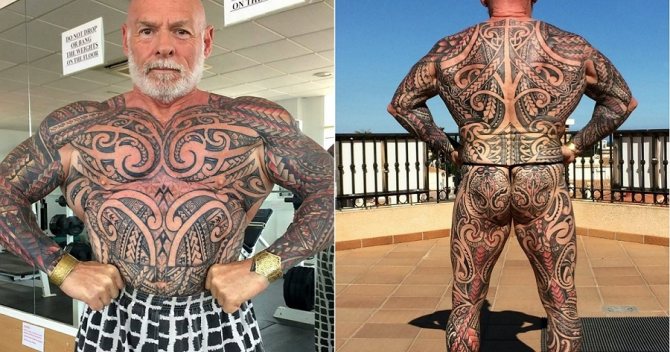
This phenomenon is also penetrating the church milieu. Either people come to God with tattoos, or Christians ignorantly, succumbing to the zeitgeist, put images and inscriptions on their bodies. There is a whole tattoo industry at the resorts. And designed for children, too: they put henna drawings, they are washed away. But in the mind embedded message that "tattoo - it's cool and stylish, when you grow up, you'll do everything in the adult. Tattoos are particularly common in Europe. Apparently the massive scale of this phenomenon in the West prompted the Old Believer Metropolis in Romania in 2021 to discuss this topic and make a special conciliar decision. Let us recall it:
"To consider tattooing the body a sin that does not prohibit baptism. To urge the members of the Church, and especially the younger generation, to abstain from this vice" (p. 4 "On the Possibility of the Admission to the Body of Christ of Persons with Discharged Body (Tattoos)").
This, by the way, is the only official opinion of the Church on this matter. As far as I know, none of the local churches have expressed their position on this issue. We do not know the reasoning behind the decision of the Metropolitan See, so we will attempt to determine for ourselves what was the basis for such a conclusion.
Corporal and spiritual dirt


Photo: Pravmir.ru
In some cases, Christianity views tattooing as a manifestation of both bodily and mental impurity. There is an opinion of some priests that by adorning themselves from head to toe with even quite innocent symbols, a person loses the image of God and becomes similar to Satan.
Professor Osipov did not say in vain "the spirit makes forms for itself", therefore tacitly many Christians consider tattoos as an imitation of the image of unclean powers, even if on a subconscious level, after all one cannot imagine a tattooed angel or saint with tattoos, can one? In addition to this, outwardly any body image merges and creates a single dirty-blue-gray mess, which resembles the usual domestic dirt, and this inevitably leads to spiritual uncleanness.
Spiritually, the tattoo glorifies sin, and not just criminal sin. If the prison symbols, thanks to contemporary movies about gangsters, are understandable even to children, then any other types of body art can evoke prodigal thoughts, bravado that contradicts God's nature, because hardly anyone consciously wants to remember illness, physical pain or suffering. A subconscious sense of impurity is another reason priests view tattoos negatively.
Having a tattoo is not a reason for excommunication or the Sacrament of Confession.
Does the Bible say anything about tattoos?
If we turn to Scripture, we see that tattoos are explicitly forbidden in the Bible. In the book of Leviticus it says:
"For the sake of the dead, do not make cuts on your body, and do not tattoo writing on yourself. I am the LORD [your God]" (Leviticus 19:28).
Obviously, this prohibition is intended to separate God's chosen people from the Gentiles. We cannot say that this Old Testament norm has lost its significance in the New Testament. It is not uncommon for present-day "writings" to have a pagan meaning as well. They are either special texts with the function of amulets or talismans, supposedly to bring good luck, or images of skulls, snakes, spiders, etc. For Christians, these symbols are all too clear and do not require deciphering. But the main thing is that pagans have no true understanding of man's relationship with God, man's place in the world and related issues. Accordingly, it must be understood that the prohibition against the tattoo comes from a right attitude toward the human body, and therefore not only does it not lose force, but it gains greater meaning after the incarnation and ascension of Christ. "Think not that I came to break the law or the prophets: I did not come to break it, but to fulfill it" (Matt. 5:17). Let us dwell on this in more detail.
How do I get a religious style tattoo?
If you are a Christian and have made the decision to get a tattoo, you may be wondering how to get a tattoo that can accurately reflect your mores and beliefs. There may not be a clear passage that forbids tattoos if you are a Christian, but it is still advisable to keep the Bible in mind when choosing a tattoo as well as its placement on your body. It is clear that the body in highly valued, therefore, that it is God's creation. You should take this into consideration when choosing which tattoo you will get, as it will stay with you for the rest of your life. You must also ask yourself why you are getting a tattoo. If it is an action against your parents, it will clearly go against the Bible, but if it is more of an artistic expression, it is more acceptable. Some Christians choose to get a tattoo with their favorite Bible verse or religious symbol to show their faith in this way. On the other hand, tattooing something that symbolically goes against your religion is obviously a bad idea. Corinthians 6:20 says.
''For you have been bought with a high price. So give glory to God with your bodies! ''
And in Corinthians 10:31
"So whether you eat or drink or do anything else, do everything to the glory of God."
. Showing love and respect for God through your tattoo actually does exactly what these verses preach. It is not at all necessary to get a religious tattoo, but it is an opportunity for those who like to express their faith in this way. It's all about how you personally interpret God's Word, because no two people are exactly alike.
What kind of tattoos Christians usually get
Christian tattoos come in all shapes and sizes. Whether you want to express your love for God with a full back tattoo or an easily concealed symbol on your ankle, we have some good ideas for you. Many Christians like to get tattoos of their favorite Bible verses because they help them remember their values and the importance of God's word. There are also many symbols representing Christ, such as doves, a cross, an angel, praying hands, or even a picture of Jesus himself. All of these tattoos can be just as meaningful to you as a piece of jewelry with one of these symbols. If you want a large Christian tattoo, you can depict one of the important scenes from the Bible, such as the Last Supper or the death of Jesus on the cross. You can also combine your hobbies with the Bible.
What should you remember when getting a tattoo for a Christian?
In the end, the decision to get a tattoo should be yours and yours alone. If you find that this tattoo is undesirable or contrary to your beliefs, then by no means do it. There is no need to make a hasty decision about the tattoo, as you may change your mind as you study. If you are still unsure, it is always a good idea to discuss it with others who share similar values. Also, perhaps more importantly, talk to God. Most importantly, make sure you are confident in your choice of whether or not to get a tattoo!
Why do people get "tattoos"?
First of all, let's try to understand what makes people get tattoos in the first place. Some people, obviously, get tattoos consciously, others simply out of imitation of their peers or "stars," out of posing. In postmodern society, the understanding of what is good and what is bad has been lost. Therefore, the prevalence of such phenomena is not surprising. There is no solid moral foundation, there is no criterion for it in the mind, there is no purpose or meaning, and there is no reflection. The body is perceived only as an external shell, with which you can do anything you want. It is my property, so I do what I want with it. Probably, the reasoning goes like this: "This is fashionable, this is considered stylish, this or that popular character did it. Why shouldn't I do it too?" Young people lack the maturity to understand that if tattoos are applied for the sake of fashion, it is simply unreasonable: one fashion today, another tomorrow, and the tattoo remains. At the same time, the body grows decrepit, and by the old age all the drawings on the body will also look as ugly as a painted corpse.
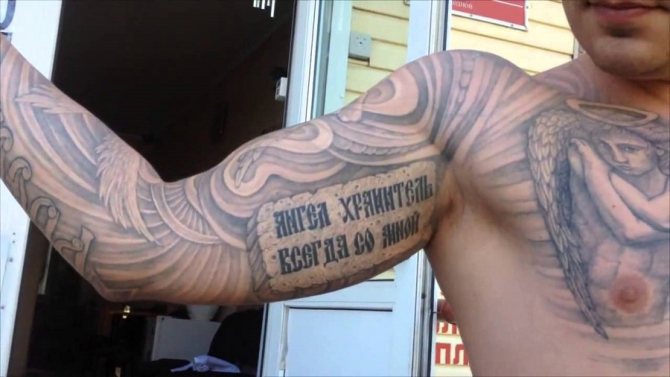

Another category is those who consciously get tattoos. There can be many reasons for this. It can be a desire to strengthen in this way their belonging to a certain group or musical trend, and self-affirmation, recognition in some circles, where it is accepted, and the desire to fix a stage in life, etc. In our country, tattoos have always been associated with the prison subculture, causing rejection by the society. The presence of such tattoos characterizes a person without extra words. As an example we can take a line from the song "Governor" by Boris Grebenshchikov, which gives a negative assessment of the blacks in power, who escaped from the mud to the riches:
"Under his Brioni shirt, tattoos on his chest, And murdered journalists Without you, you're a dime a dozen."
We won't dwell on the prison subculture. Let us only note that prisoners' tattoos have a special meaning and language that is understood unambiguously in their world. The use of tattoos in the criminal environment is highly regulated, and inaccuracies here can lead to serious conflicts.
Decorative tattoos do not carry this semantic load. Nevertheless, the presence of such "accessories" influences the consciousness of their carriers, creates a psychological attitude, determine the model of behavior. People with tattoos, with whom I was able to communicate, admitted that after the application of inscriptions and drawings "something happens internally, something changes". It cannot be otherwise. Recall the philosophical principle of the dialectical unity of form and content: there is no material system that does not have content and form.
The Specifics of Various Religious Texts
Consider the leading religions of the world, which are often reflected in the form of tattoo prayers.
- Christianity. Orthodox, Catholics, and Protestants address God according to the text of Scripture. Full quotations from various parts of the Bible, the Lord's Prayer, Agnus Dei, and winged expressions are often inscribed.
- Islam. Muslims can inscribe namaz or dua in Arabic, the language of the Koran. The former is a great ritual; the latter is a simple invocation. To pray for Muslims means to uphold one of the five pillars of tradition. It is optimal to recite the prayer in a mosque, but a Muslim should perform the ritual where he or she is caught up in the moment of namaz. For many it is a symbol of Allah's protection.
- Judaism. Jews pray by the hour, as it was prescribed even during the Babylonian captivity. Often the Hebrew text is accompanied by numerical values and Kabbalah symbols.
- Buddhism. By and large, there are no prayers in this tradition, but there are mantras and meditative texts. They require accurate pronunciation in the original language - Tibetan, Sanskrit, Chinese, Japanese.
- Hinduism. Here you can find quotations from the Vedas, images of Hindu gods and asuras, the sign Om as a symbol of connection with the source of life.


The question is what variations there might be of such drawings. What can be added to the translations or the original? If the prayer tattoo does not fit on the body area, it is replaced by numerical and alphabetic designations - a reference to the holy books and a certain section. There can also be additions in the form of crosses, the crescent moon, hands in a prayer gesture and other attributes of religion. But there are usually no superfluous details; every detail counts.
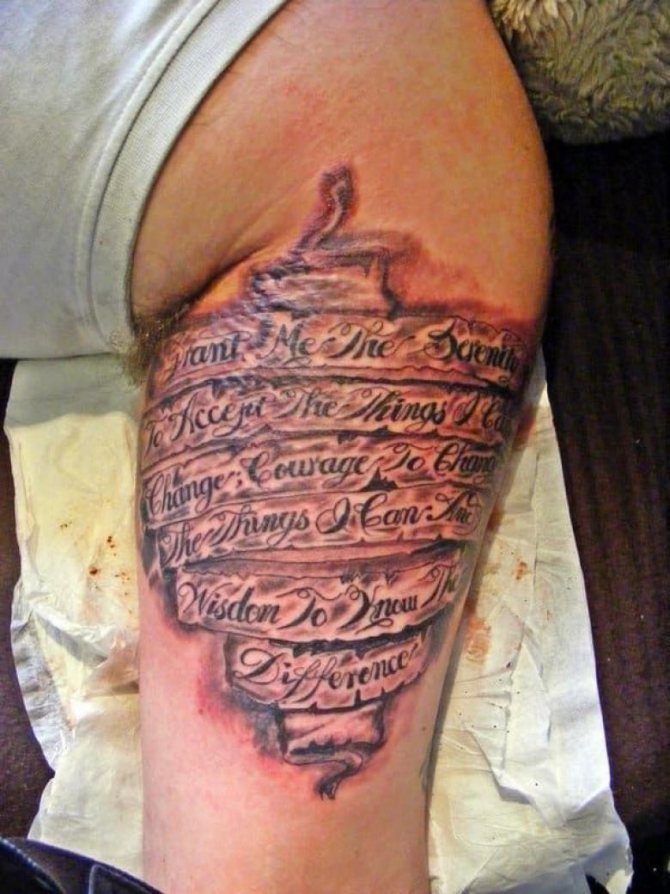

Perhaps the most popular image in Christianity is that of a painting by Albrecht Dürer with folded arms and a cross on a chain. To it may be added rosary beads, doves, other details, and biblical lines. But mostly these variants of the prayer tattoo are common in the West, not in the Russian Orthodox tradition.


There are other religions that are less common - for example, paganism, Zoroastrianism, Sikhism. Not all traditions have their own holy books, as well as classic versions of prayers, but runes, pagan symbols, images of the gods can be stuffed as analogues.
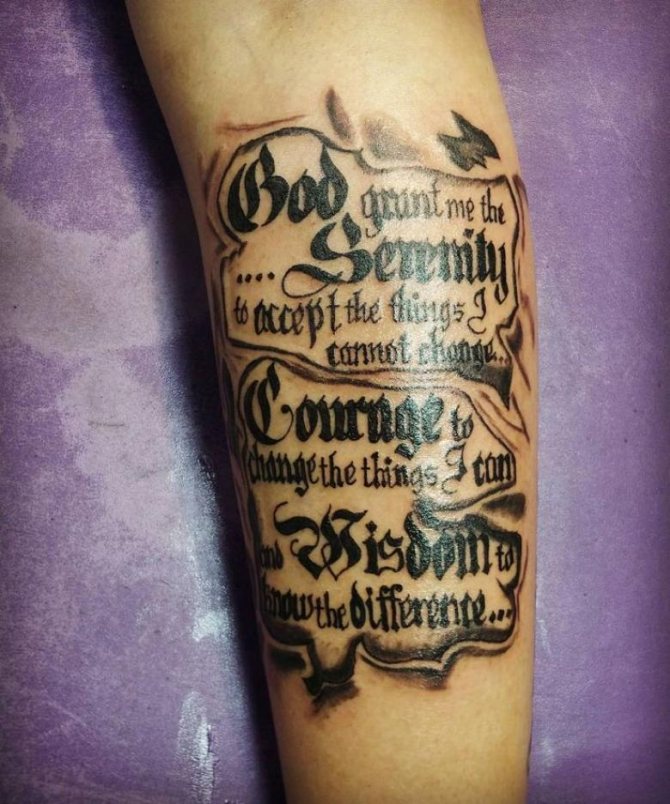

Tattoo and the inner spiritual world
The form is meaningful and the content is designed. Not only tattoos, but even clothing can determine behavior. So, for example, in Russia and many other countries of the world it is obligatory to dress a judge in a mantle. It conveys a sense of solemnity and dignity to the event and is experienced by both the judges themselves and those present. The same can be said of clergy, police officers, and the like.
Considering further the form and content in this context, it becomes clear that applying a tattoo to the body is always a transition from inner work on oneself to outer adornment, peculiarly understood. Often it is a sign of inner weakness: man has no other means of raising his own importance. God gave man the ability to create. It is a need, but in this case it takes a distorted form. If you look closely, you can see in the eyes of all tattooed people an inexpressible longing for the heavenly and eternal, an insecurity in themselves and a spiritual emptiness. Mikhail Krug captured this very subtly in one of his songs, putting the following words into the mouth of a prisoner:
"Ringleader, taper my domes, Near me - a miraculous cross with icons, That there the bells would play With tinkles and chimes."


This brings to mind our Soviet-era desecrated churches, with drawings and inscriptions that also express a form of prayer. Pitiful, sinful, but nevertheless unconsciously directed toward a connection with the Eternal.
I once had the opportunity to talk to a man who had his own tattoo parlor in Moscow. He said he often acts as a psychologist when people come to him who haven't found themselves, who don't know what they want, who haven't even decided what kind of drawing to put on themselves. Some he even discouraged. For example, teenagers who want to put tattoos on their face, to spite everyone. "You don't like the way I am, let's see how it feels to see me like this!"
Obviously, in a situation like this, it's not enough to just declare a tattoo a sin, you need a justification. We need to give a helping hand, and for that, it is important to give something more in return.
First of all, let's point out that man is a creature of God. God created all things "very well" (Gen. 1:31). Consequently, making changes to the body, including tattoos, is a rebellion against God. In the life of St. Peter of Galatia there is such an episode. A woman, adorned with rouge and whitewash, comes to him for healing.
- What would you say," the old man said to her, "if you saw a painter who spoils the creation of a great artist: he would whitewash the face painted according to his inspiration, pour over the paint, blacken the eyebrows and eyelashes?
The woman fell to her knees and tearfully begged forgiveness.
- Remember, my daughter," he went on, "that if such corrections are offensive to the artist, all the more so to the Wise Creator, who so wonderfully adorned man, 'who diminished him with little than from the angels' (Psalm 8:6), to the Great Artist, who gave you your beauty.
The objective criterion of morality for the Christian is the Scriptures, the revelation of God to man. If we turn to it, we find that it condemns not only tattoos, but even immodest clothing and the excessive use of cosmetics. God, through the mouth of the prophet Isaiah, threatens the following penalties for these sins:
"And it shall come to pass: instead of incense shall be stench, and instead of a belt thou shalt gird thyself with rope, and instead of golden ornament upon thy head thou shalt have a bald spot for thy works, instead of a scarlet robe thou shalt wear a sackcloth. And your most beautiful son, whom you love, will fall by the sword..." (Isaiah 3:23-24).
This was the case in Old Testament times. For Christians, however, there is an even greater condemnation for such sins. "If even then, before grace and such wisdom, it was condemned," says St. John Chrysostom, "what justification can today's wives have, who are called to heaven and to greater exploits, who are obliged to compete with the angels.
The Church considers the human body to be a sanctuary and a temple of the Holy Spirit. The Apostle Paul says:
"Know ye not that your bodies are the temple of the Holy Ghost which dwelleth in you, which ye have of God, and ye are not your own? For you have been bought with a high price. Therefore glorify God both in your bodies and in your souls, which are God's" (1 Corinthians 19-20).
Two fundamental points must be emphasized here. First. We are not our own, we are God's, our body does not belong to us in the full sense, we cannot do whatever we want with it. Second, we can and should glorify God not only in our souls, but also in our bodies. We know that God glorifies the bodies of His chosen servants through the imperishable relics and the miracles that flow from them. And these apparitions serve as a kind of foreshadowing, an image and a symbol of the divine and heavenly glory of the saints, which will be revealed after the general resurrection. Hence it follows that the Christian should take care of his body and treat it with reverence. "For no one has ever hated his flesh, but nourishes and warms it" (Eph. 5:29).
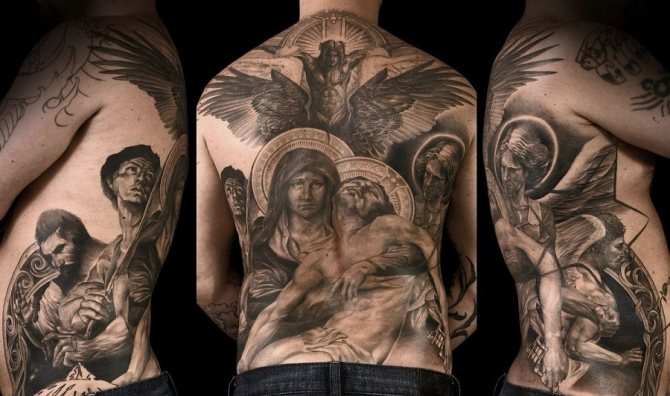

Further, the human body is sanctified in the Church in the Sacraments of baptism, anointing, communion, and consecration. In baptism the Christian is "clothed with Christ" (Gal. 3:27) and should strive in all things to follow "His steps" (1 Pet. 2:21). And just as we cannot put inappropriate inscriptions on sacred vessels, so it is unacceptable to do so on our bodies. This sanctification of human flesh is based on the great sacrament of the divine incarnation, death, resurrection, and ascension of Christ. The Lord took flesh, made it His own, and deified it, according to the Gospel, "And the Word became flesh and dwelt among us, full of grace and truth" (John 1:14). With His embodied flesh Christ ascended into heaven "and sat down at the right hand of God" (Mark 16:19). And since our Lord Jesus Christ became a perfect man in soul and in body, like us in everything, except sin, so He also gives us, who believe in Him, from His Deity and makes us kindred unto Himself according to the nature and essence of His Deity. Shall we Christians, who have such gifts and promises, who long for the resurrection of the dead, defile our flesh with writings and images?
(Or Why shouldn't I get tattoos or other body piercings?)
1. Because it is against God (God forbids it).
The Lord warns His people not to make any rifles or tattoos on their bodies: Leviticus 19:28 "For the sake of the dead, do not make any rifles on your body, nor do you tattoo any writing on yourself. I am the Lord." Also Deuteronomy 14:1 "You are sons of the LORD your God; you shall not make any cuts on your body, and you shall not cut out any hair above your eyes for the deceased." 2. Because this practice is associated with idolatry.
The above-mentioned passage in 1 Samuel 18:22-29 testifies to this.
Also note the relationship between pagan idolatry and earrings:
Genesis 35:2-4 "And Jacob said to his house and to all who were with him, "Throw away the foreign gods that are with you, and make yourselves clean, and change your clothes; let us arise and go to Bethel; there I will build an altar to God, who heard me in the day of my distress and was with me in the way that I went. And they gave Jacob all the foreign gods that were in their hands, and the earrings that were in their ears; and Jacob buried them under the oak tree that is near Shechem."
3. Because the practice is associated with the occult.
Leviticus 19:28 "For the sake of the dead, do not make cuts on your body, and do not tattoo writing on yourself. I am the Lord." Also Deuteronomy 14:1 "You are sons of the LORD your God; do not make cuts on your body, and do not cut out hair over your eyes for the dead."
According to pagan customs, tattoos and cuts on the body were made either to honor the dead (as a remembrance or reminder of the dead) or for the purpose of entering into a trance during occult séances and entering into communion with the dead (summoning of spirits). The Lord God warned His chosen people not to engage in the occult in any form, calling the occult "an abomination."
Deuteronomy 18:9-12 "When you enter the land which the LORD your God is giving you, then you shall not learn to do the abominations that these nations have done: you shall not have him who puts his son or daughter through fire, a diviner, a fortune-teller, a fortune-teller, a charmer, a conjurer, a spirit-caller, a magician and a questioner of the dead; for everyone who does these things shall be abominated before the LORD."
So, piercings, tattoos, and body markings have pagan occult roots.
In the New Testament, the practice of self-mutilation was associated with possession. Mark 5:2-5 "And they came to the other side of the sea, to the country of the Gerasenes. And when he came out of the boat, immediately there met him a man who had come out of the tombs and was possessed by an unclean spirit, and he had dwelling in the tombs, and no one could even bind him with chains, because many times he was shackled and chained, but he broke the chains and broke the bonds, and no one was able to tame him; always, night and day, in the mountains and the tombs, he cried and beat on the rocks.
Yes, and in the Old Testament the rifling of the body was associated with possession. Let's turn again to the story in 3 Samuel 18. Verse 28 says that the priests of Baal stabbed themselves with knives and spears while worshipping Baal, and verse 29 calls it demon-possession: "And they began to shout with a loud voice, and stabbed themselves with knives and spears according to their custom, so that blood poured down upon them. And it was noon, and they were still demon-possessed until the time of the evening sacrifice; but there was no voice, no answer, and no hearing."
4. Because this practice is an opposition to the Creator
When the Lord God created man, male and female, He said He did it very well: Genesis 1:31a "And God saw all that He had made, and, behold, it was very good.
So, man was created by God very well. Those who think that tattoos and cuts on the body can improve God's creation, make it even more beautiful and attractive, are defying the Creator. With their tattoos, piercings, and rifling they show that God didn't create them well enough. In fact, it is self-mutilation.
5. Because our body is God's temple
God's Word teaches us that our bodies are the temple of the Holy Spirit and that no one has the right to defile that temple. 1 Corinthians 3:16 "Do you not know that you are the temple of God, and the Spirit of God dwells in you? " Also 1 Corinthians 6:19-20 "Do you not know that your bodies are the temple of the Holy Spirit who dwells in you, whom you have from God, and you are not your own? For you have been bought with a high price. Therefore glorify God both in your bodies and in your souls, which are God's."
Tattoos and other cuts and tattoos on the body are the same as writing on the wall of the temple. They do not decorate the temple, but defile it and the God who dwells in it.
6. Because it does not glorify God.
1 Corinthians 6:19-20 "Do you not know that your bodies are the temple of the Holy Spirit who dwells in you, whom you have from God, and you are not your own? For you have been bought with a high price. Therefore glorify God both in your bodies and in your souls, which are God's." 1 Corinthians 10:33 "So whether you eat or drink or do anything else, do everything to the glory of God. Do not give offense to Jews or Greeks or to the church of God, just as I please everyone in everything, seeking not my own benefit, but the benefit of many, that they may be saved.
God's word calls us to praise the Lord not only in our souls, but also in our bodies.
7. Because it does not adorn us
The Bible urges us, especially women, to dress in proper clothing with modesty and chastity: 1 Timothy 2:9-10 ... "that even wives, in proper attire, with modesty and chastity, adorn themselves not with braided hair, nor with gold, nor with pearls, nor with precious clothing, but with good works, as is proper for wives who devote themselves to godliness. What is a proper and chaste garment? It is a modest garment that covers, not advertises, the places where one is a pied piper. Such clothing is not provocative. Let's return to tattoos and all kinds of body tattoos and cuts: they are provocative and exhibit qualities of man that are the opposite of bashfulness and chastity. Thus, tattoos and piercings are not elements of "decent attire.
8. Because it can be dangerous to one's health.
One of the dangers of tattoos and body piercings is the risk of contracting a disease. Recent medical research has confirmed doctors' fears that AIDS can be transmitted through contaminated tattoo ink and needles. In addition, it was found that not only AIDS is transmitted this way, but also hepatitis and other viruses and diseases.
In addition, deep punctures in the skin traumatize the nerve endings in and under the skin. This can lead to physiological disorders of the body in the future.
The current active propaganda of tattoos in the society and the mass passion for tattoos among different layers of the population is nothing else but brain washing and nothing else as preparation of the world community for the drawing of the Beast described in the 13th chapter of the Revelation of John the Evangelist.
So everyone has to make a choice whether to accept the Holy Spirit or the Antichrist.
Which choice will you make?
A recent study showed that tattoos can increase the risk of skin cancer.
Over the past 10 years, almost everyone has gotten a tattoo. Therefore scientists decided to elaborate on this social problem. Having studied all the pros and cons, the scientists found out that tattoos are fatal for a person, no matter what kind of tattoo (temporary or permanent).
Canadian scientists have found that liver disease is directly related to tattoos. The main reason for this are the tools used during the application of the tattoo. It is very easy for infections to get into the human body, because mostly tools are used for tattooing more than one patient.
Tattoo harms are carried by the inks that are used during the application of different sized tattoos, are not kept in sterile refrigerators and therefore are carriers of various infections. Tattooing can bring with it diseases and infections such as allergic reactions, HIV and AIDS, and infections.
Research has shown that tattoo inks can contain toxic substances that can cause skin cancer.
This is especially true of blue dyes, which may contain cobalt, aluminum, and red dye may contain mercury sulfide. Other colors may contain cadmium, chromium, nickel, titanium, and other heavy metals.
In addition, if tattooing and piercing equipment is contaminated with blood infected with various viruses, it can lead to the transmission of viruses such as HIV, hepatitis B and C, as well as various forms of skin cancer.
However, almost everyone is at risk because most tattoo artists use ink containing arsenic, doctors explained.
TATTURES. God made the human body perfect. Remember, "And God saw all that He had made, and, behold, it was very good" (Genesis 1:31). Don't throw down the gauntlet to God with the challenge, "I will do better." It won't get any prettier. Perfection cannot be perfected. There have been many such attempts. The result is sad. Because of these rational proposals on "change and improvement" our earthly life has been shortened for many years, we live on a polluted land, and morally we are in a geometric progression of sin.
Tattoos are a terrible thing. We offend God and create problems for ourselves which did not exist before.
How is the presence of God in the human heart determined? By outer modesty and inner bashfulness. A tattoo is an escape from modesty, because you try to distinguish yourself, but at the same time it is a killer of modesty, because it harms the soul.
And one more characteristic feature of the currently so fashionable tattoo. Having made up your mind to such an execution over your own body, you, besides the listed sins, are also engaged in self-mutilation. Examples when tattooing becomes the cause of a variety of diseases, including AIDS - a huge number. Visit a dermatologist and complain about a skin disease. The doctor's first question will be about the tattoo.
The history of tattoos goes back many thousands of years. It was a very widespread occult-magical technique throughout the ancient and wild world. Initially it was not intended for artistic body painting but for making concrete changes in the state of human consciousness and behavior. Some of their "aesthetic" effects are only incidental to its functions.
Let us recall, for example, that many Indian tribes bore the name of some animals: bear, wolf, fox, eagle, bison, falcon... Their multicolored images were used there to paint the bodies of warriors. They were convinced that if they put the image of a leopard on their skin, they would acquire its qualities - dexterity, strength, cunning, silence, caution... - or even the spirit of this animal would possess them. No animal spirits were instilled in them, but demonic forces were instilled in souls of people who made such manipulations with great pleasure.
Although it would seem that ancient times have long ago passed, however the occult-magical nature of tattoos and their connection with the dark spirits of the invisible world have not disappeared. That is why drawings-symbols that are applied on the skin have a very effective impact on psyche: they are literally imprinted in it and change it. And this is appropriately reflected on the properties of the human body, mind and senses.
Today's youth are lured by their external qualities, which young people find very attractive. However, as we can see, this is far from being the case, and their attractiveness is deceptive and destructive.
As for the appearance of tattoos in Russia, in general, they have never been peculiar to the Russians. It is not our mental or spiritual tradition, it is not our culture of physical health and beauty, it is not our experience and heritage of our fighting spirit. Have you ever heard that Dmitry Donskoy, Oslyabya and Peresvet, Alexander Nevsky, Fyodor Ushakov, Ivan Poddubny, Georgy Zhukov, Alexander Pokryshkin, the Panfilov heroes... used the tattoo technique. So they painted themselves before a fight?! There is no such thing in Russian folk tales or in the true stories of our victories and accomplishments. Why is it so easy for our young people to pick up the Western rot? It's a pity! It seems that in the era of Soviet-atheist persecution of Orthodoxy, Russia's moral immunity has weakened. Tattoos are one of the moral subversive landmines planted under the future of Russia.
Our adults and elderly people are averse to this phenomenon.
I once witnessed such a scene. Two girls were talking loudly in the subway, paying no attention to anyone and, apparently, even hoping to attract the interest of others to their personalities. You've probably met some of them. It was a hot summer day, they were dressed minimal, everything was very short, their stomachs and loins were uncovered. They had several tattoos on their bodies, and on the stomach and below the back the tattoos went deep down, under the miniskirts. Next to them stood a man of a very respectable age and appearance. It was impossible not to notice these girls. He looked at them, looked at them, then suddenly, but somehow very calmly and even good-naturedly asks them: "And tell me, my darlings, why did you ruin your skin?" The people standing nearby smiled at this unexpected appraisal of the tattoos, while the maidens became quiet somehow, did not answer anything and soon left. That's it - when negative phenomena are ridiculed in a kind manner, not with irritation and anger, they try to disappear unnoticed.
♦ What is the essence of the occult-magical nature of tattooing?"
The essence of occult-magical motives and ways of applying tattoos is the purposeful attraction of dark forces into one's life. And this is no longer just a spontaneous hubris or a whim of the precocious minors, this is the direct joining of a person with evil. It can be unconscious, when a person is not told anything about what and how tattoos are applied to him. And it can be conscious, when a person himself, by his own will, places himself at the disposal of the dark forces. If a person consciously accepts the occult-magical nature of tattoos, then the degree of their destructive influence increases. It increases even more if combined with alcohol, drugs, beer and psychedelic intoxication at discos and computer games. At first they cause adrenaline, courage and bravado, inflated self-esteem, "authority" and "respect," but then comes the inevitable payback: the loss of both physical and spiritual health. Moreover, the devastating effects of tattoos may not manifest themselves until many, many years later.
However, I would like to pause here, because the topic of magic and occultism is so ungrateful that it is never useful to go deeper into it. I will only note that the dark-magical side of tattoos is not usually advertised and is masked by their sexual or some "aesthetic" appeal. That's what inexperienced young people fall for. They run after beauty and end up in a swamp.
Question:
There is a passage in the Old Testament that speaks of the prohibition of placing images and inscriptions on the body (in Leviticus). Can this passage be related to the current tattoo? That is, is it a sin? And are there any other places in the Bible that would mention this? Thank you in advance.
Olga
ANSWER:
"For the sake of the dead, do not make cuts in your body, and do not tattoo writing on yourselves. I am the Lord" (Lev.19:28). This prohibition is repeated twice more: Lev.21:5; Vt.14:1. In this verse, it is indeed forbidden to put pictures on the body by piercing or rubbing paint, as was common among the pagan peoples. The attitude toward the body in the inspired Old Testament religion is fundamentally different from paganism. The miraculous union of body, soul, and spirit forms one person created in the image of God. Virtues are good not only for the soul, but also for the body: "A meek heart is life to the body, but envy is rottenness to the bones" (Proverbs 14:30). The human body bears witness to the wisdom and omnipotence of the Creator. The Bible speaks of the corruption of human nature by sin, but about the body as God's creation, not a single disparaging word. Plato called the body "prison of the soul", and St. Paul speaks of "the redemption of our body" (Romans 8:23). This is why the Mosaic law forbade the adoption of pagan practices. The special mutilation of the body, created by God, is an insult to God. "For you have been bought [dearly] at a price. Therefore glorify God both in your bodies and in your souls, which are God's" (1 Corinthians 6:20).
What to do about tattoos if you already have them?
So what should you do if you have tattoos? For people who enter the church through baptism, this is not a barrier. The aforementioned Council of the Metropolis of Belokrinitsa emphasized this in its decision. Apparently, in practice there were cases where priests did not know what to do and demanded that the tattoos be removed. But this is very expensive and not always possible, although desirable. If a person has defiled his body with tattoos after baptism, he should repent of what he has done and undergo certain penance. We believe that those clergymen who order tattooed individuals to always wear clothes concealing the inscriptions and drawings as penance are right. Those who work in this industry should leave it as sinful.
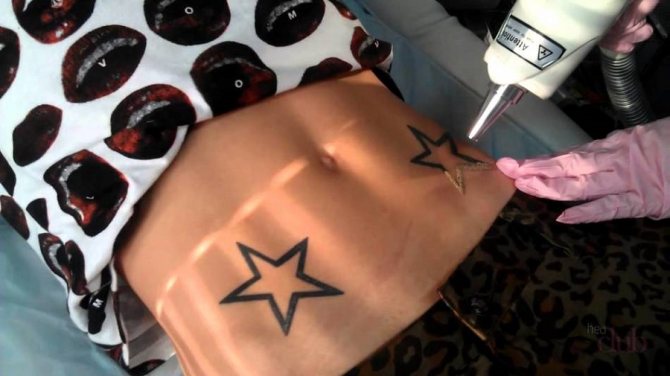

Another question remains, still hypothetical: can a wearer of tattoos become a priest? Let us express our private opinion, which needs to be considered collectively. We think there may be an impediment to ordination of a physical nature, related to the bodily defects of the appointee. In the same way that scopts are not allowed into the clergy (according to the first rule of the First Ecumenical Council, "If, when healthy, he has made a scoping of himself, he must be excluded, even if he is numbered among the clergy"), so are tattooed people. Especially if these tattoos cannot be concealed. How can a man with a tattoo on his arms be a liturgist? And who would approach him for a blessing?
Such is our reasoning on this topic. And I would like to end with an appeal to avoid the evil described in the words of the great apostle Paul:
"What is the commonality of the temple of God with idols? For you are the temple of the living God, as God said, 'I will dwell in them and walk in them; and I will be their God, and they shall be my people. And therefore come out from among them, and be separate, saith the Lord, and touch no unclean thing; and I will receive you. And I will be a Father to you, and you shall be My sons and daughters, says the Lord Almighty. Beloved, having therefore these promises, let us cleanse ourselves from all filthiness of the flesh and spirit, doing holiness in the fear of God" (2 Cor. 7:1).
What should those who come to the temple with a tattoo on their body do?
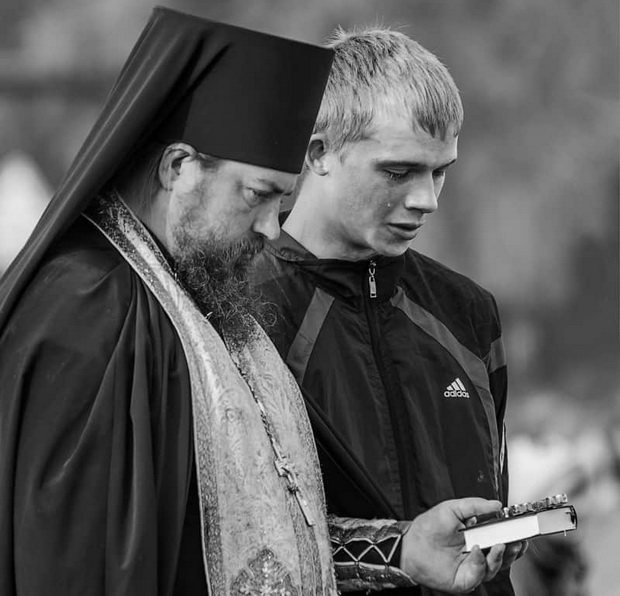

Photo: Troickiy.cerkov.ru
If you have tattoos, repent of it in confession. Priests are usually sympathetic to the mistakes of youth, so you should not be afraid to approach the priest. If the tattoo can not simply be taken out, try to choose such clothes that the body image was not visible in the temple, so as not to embarrass the congregation. The ideal is to get rid of tattoos as soon as possible, especially if they contain aggression, profanity, lewd pictures that can provoke sinful thoughts in others or set a bad example for young people.
Remember that your body was created by the Creator for love and prayer, not for pain, which a man with tattoos inflicts to himself, not for a reminder of sins and not for provocation, but for serving God and good, Christian commandments of true wisdom, faith and love. Be beautiful and take care of your God's image and health. Christianity and tattoos are incompatible.
(6 grades, average: 4,00 of 5)
The character of the owner of the tattoo prayer
Apparently, in front of us a man with a difficult experience and serious outlook on life. But let's look at it from a different angle.
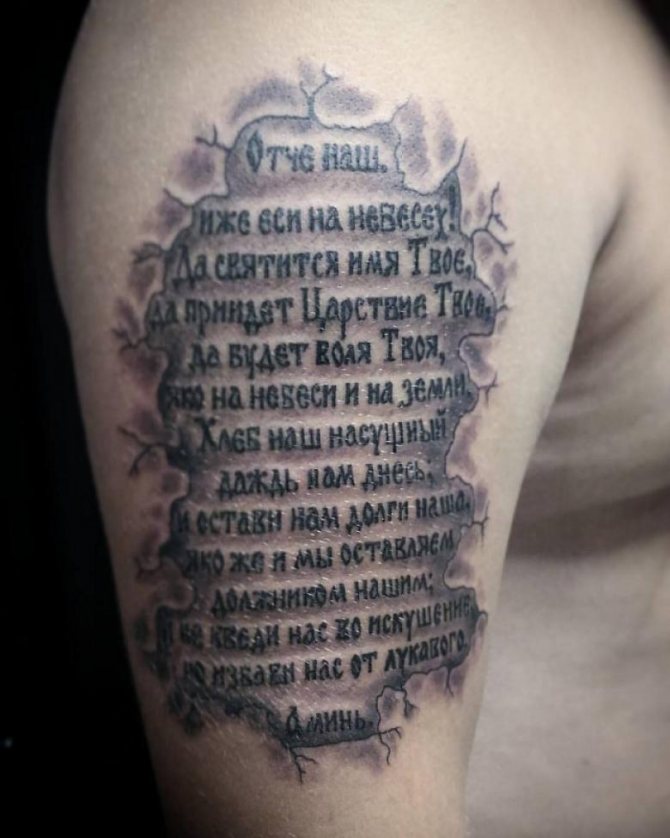

Historically, all sorts of "domes" and tattoos of prayer were stuffed onto themselves by prisoners - they could not be whipped if they had religious symbols on their backs. Now, it's everyone's free choice. And if he decided to get a prayer tattoo, it means there was a personal reason - a vow, salvation and help from the gods, the hope for protection in terrible situations.


It is not worth commenting or discussing in any way this type of tattoo - you could seriously offend people. They themselves can tell about the meaning of the drawing and the reasons for its appearance. We are not necessarily faced with a religious fanatic, just a very serious and deeply religious person. It is unlikely that such things are stuffed just in the mood - it does not bring good luck in life.
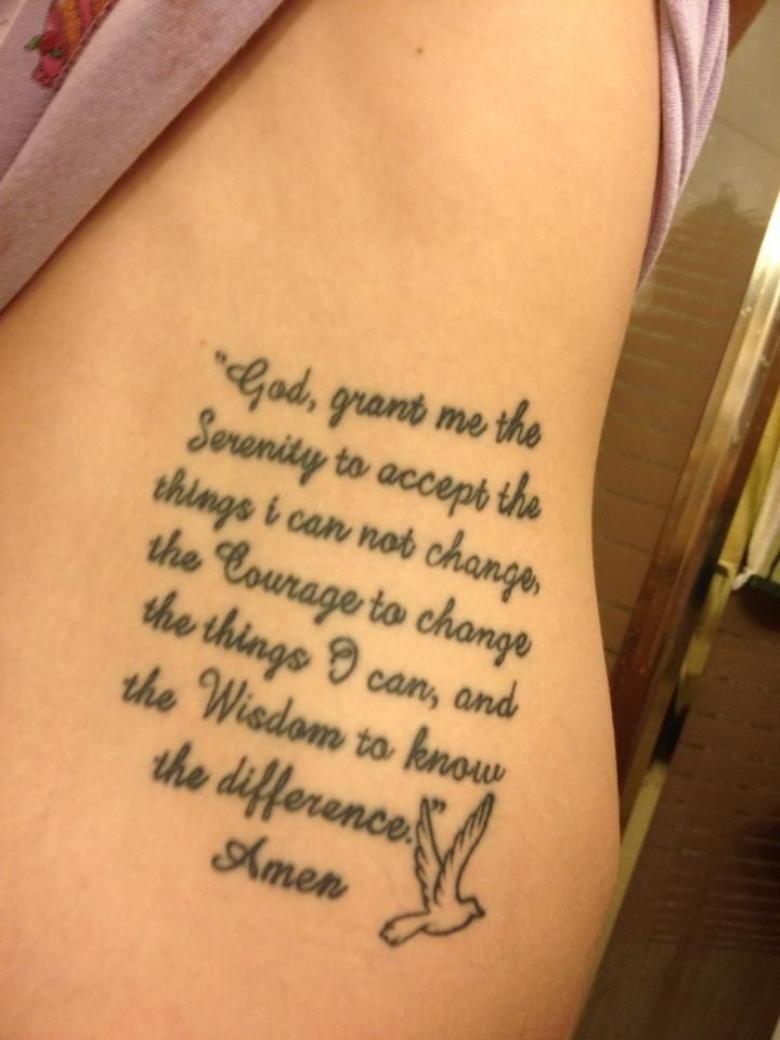

For the bearer of a tattoo a prayer is a way of uniting with God, sacred texts remind of the main thing and make you think about observing the rules of tradition and the given promises. Especially if the prayer tattoo is low-key and not flashy, as a rule, it is not exposed. This is a way of saying "thank you" to the Creator.
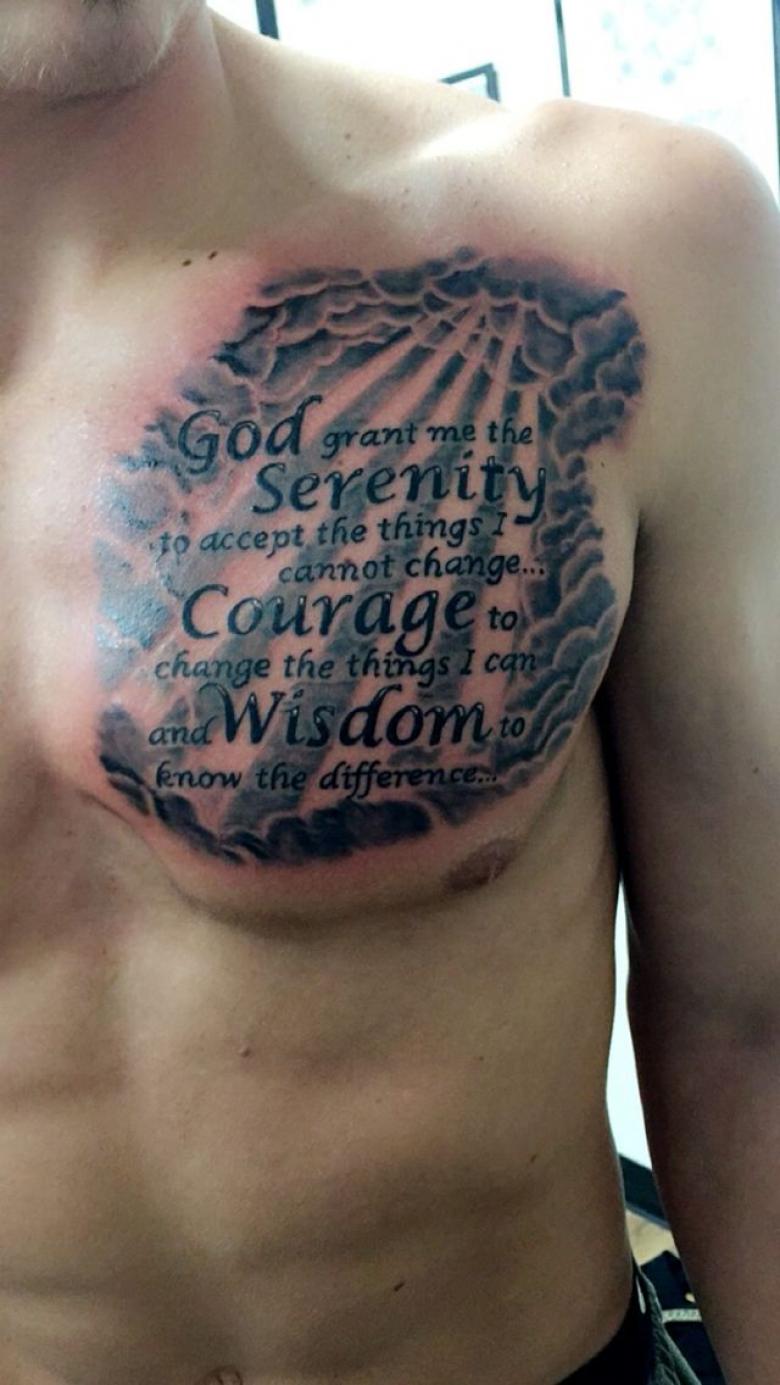

Nabbing such tattoos is preferably above the waist. For the text to be well read and not confused, it is made on the back, shoulder blade, along the forearm.


Celebrities also often impale themselves with religious images. For example, Angelina Jolie is known for her Buddhist mantras on her back. And Justin Bieber has a tattoo in Hebrew that means the name of Jesus.



